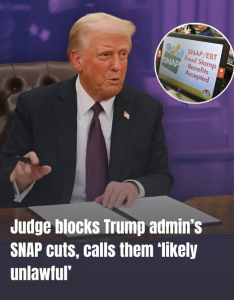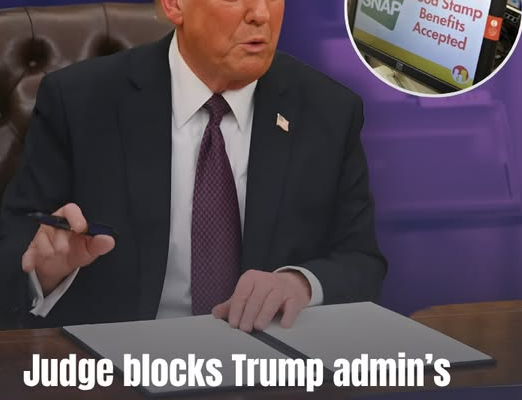Federal Judge Rules Trump Administration’s SNAP Benefits Cutoff ‘Likely Unlawful’ 🇺🇸⚖️
In a significant rebuke to the former Trump administration’s efforts to tighten eligibility for food assistance, a federal judge has ruled that the proposed cutoff to the Supplemental Nutrition Assistance Program (SNAP) — commonly known as food stamps — was “likely unlawful.” The decision not only protects millions of low-income Americans who rely on the program but also raises deeper questions about how far executive agencies can go in changing social safety nets without Congressional approval.
The Background: Trump’s Push to Restrict SNAP Access
During Donald Trump’s presidency, the administration sought to overhaul the nation’s welfare system with what it described as “common-sense reforms to promote self-sufficiency.” Central to that effort was a proposal to tighten work requirements for certain SNAP recipients — specifically, able-bodied adults without dependents (ABAWDs).
Under existing rules, this group was required to work or participate in a job-training program for at least 20 hours per week to receive benefits beyond a three-month period. However, states had long been able to request waivers to suspend those rules during times of high unemployment or local economic hardship.
The Trump administration aimed to drastically limit those waivers, effectively pushing an estimated 700,000 people off SNAP. Critics warned that the move would harm vulnerable individuals, especially in rural areas and communities still recovering from job losses or low-wage conditions.
The Court Challenge: States Push Back
A coalition of more than a dozen states, along with the District of Columbia, quickly sued to block the rule from taking effect. Their argument was clear: the U.S. Department of Agriculture (USDA), which oversees SNAP, had overstepped its authority by attempting to rewrite Congress’s intent through regulation rather than legislation.
They also argued that the administration’s changes ignored the economic realities of millions of Americans who faced unstable employment or barriers to work, including lack of access to transportation, child care, or consistent job opportunities.
As the pandemic took hold in 2020, these arguments became even more compelling. With unemployment skyrocketing and food insecurity spreading, the plaintiffs urged the court to intervene — and the judge agreed.
The Judge’s Decision: “Likely Unlawful” and “Arbitrary”
In a strongly worded ruling, U.S. District Judge Beryl A. Howell (D.C.) concluded that the Trump administration’s SNAP rule was “arbitrary and capricious” — a legal phrase meaning that the government failed to provide adequate reasoning for its policy changes.
Judge Howell wrote that the USDA “failed to address the critical issue of how the rule would impact vulnerable populations and states’ ability to respond to economic downturns.” She also noted that the administration’s justification for the rule — to promote work and reduce dependency — lacked sufficient evidence that the policy would achieve those goals without causing unnecessary harm.
“The agency’s disregard for the reality of economic hardship and its failure to justify a rule that would strip food assistance from hundreds of thousands of people renders it likely unlawful,” Howell wrote.
The judge issued an injunction blocking the rule from taking effect nationwide, a decision that effectively preserved food assistance for hundreds of thousands of Americans during a time of acute economic uncertainty.
Human Impact: Food Security on the Line
For those who depend on SNAP, the ruling was more than just a legal victory — it was a lifeline. Across the country, food banks had already been struggling to meet demand, especially during the COVID-19 crisis.
Social workers and advocacy organizations warned that the Trump-era rule would have deepened poverty and hunger, forcing many Americans to make impossible choices between paying rent and buying food.
“It’s easy to talk about ‘self-sufficiency’ from an office in Washington,” said Abby Lieberman, an anti-hunger advocate based in Maryland. “But for millions of Americans, especially those in unstable part-time work, SNAP is what allows them to survive.”
The program, which serves over 40 million Americans, has long been one of the most effective tools in reducing hunger and supporting families through periods of job loss or low income. Studies have shown that access to SNAP is linked to better long-term health outcomes, improved child development, and even higher employment rates — undermining the idea that it discourages work.
The Political Divide: A Larger Debate About Welfare
The fight over SNAP has long mirrored broader ideological divides in American politics. Conservatives often frame restrictions as necessary to curb fraud and promote personal responsibility, while progressives argue that the real problem lies in economic inequality and stagnant wages.
The Trump administration’s proposed rule was one of several attempts to reshape social welfare programs through executive action, rather than legislation — a strategy critics say sidestepped Congressional authority.
Meanwhile, Democrats and anti-poverty groups hailed Judge Howell’s ruling as a victory for fairness and humanity. Rep. Marcia Fudge, who later served as President Biden’s Secretary of Agriculture, called the decision “a reaffirmation that compassion and common sense still have a place in policymaking.”
The Biden Administration’s Response
When President Joe Biden took office, his administration quickly moved to reverse many of Trump’s SNAP restrictions. In early 2021, the USDA formally withdrew the challenged rule and expanded access to food assistance during the ongoing pandemic.
Under Biden, SNAP benefits were also increased temporarily to reflect higher food costs — marking the largest permanent benefit increase in the program’s history.
Still, the case remains a key legal precedent for how far executive agencies can go when implementing welfare reforms. It underscores the judiciary’s role in holding administrations accountable when policy changes appear rushed, politically motivated, or insufficiently justified.
A Broader Lesson: Law, Humanity, and Leadership
At its core, the ruling wasn’t just about bureaucracy or politics — it was about people. It served as a reminder that policies written in offices have real consequences in kitchens across America.
The court’s message was clear: federal agencies cannot disregard the human cost of their decisions, nor can they rewrite laws without Congress.
As Judge Howell’s decision echoed through headlines, it also reignited a national conversation about dignity, compassion, and what kind of country America chooses to be.
In a time of deep political division, one thing became undeniable — access to food should never be treated as a privilege, but as a fundamental right.

